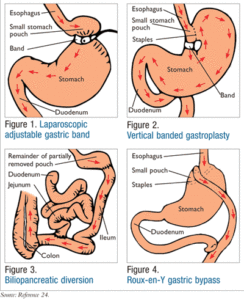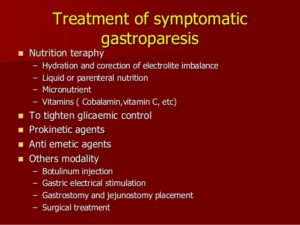How is Gastroparesis Treated?
The treatment for gastroparesis in an individual depends on the severity of symptoms. Treatments are aimed at managing symptoms over a long-term.
Treatment approaches may involve one or a combination of:
- dietary and lifestyle measures,
- medications, and/or
- procedures that may include surgery, such as
- enteral nutrition,
- parenteral nutrition,
- gastric electrical stimulation (Enterra), or
- other surgical procedures
Some people with gastroparesis have mild symptoms that come and go, which can be managed with dietary and lifestyle measures.
Others have moderate to more severe symptoms that additionally may be treated with medications to stimulate motility and/or reduce nausea and vomiting.
Some people have severe symptoms that are difficult to treat or do not respond to initial treatment approaches. They may require additional procedures to maintain nutrition and/or reduce symptoms.
Goals of Treatment
The goals of treatment are to manage and reduce symptoms, maintain quality of daily living, and minimize related problems such as:
- Severe dehydration due to persistent vomiting
- Bezoars (solid collections of food, fiber, or other material), which can cause nausea, vomiting, obstruction, or interfere with absorption of some medications in pill form
- Difficulty managing blood glucose levels in people with diabetes
- Malnutrition due to poor absorption of nutrients or a low calorie intake
Manage Risk and Benefit
No single treatment helps all persons with gastroparesis. All drugs and procedures have inherent risks, some more than others. Some of the risks are unavoidable, while others can be avoided and managed. For patients and families it is important to talk to the doctor or health care team about both benefit and risk.
As a patient, in the context of your personal illness status, consider:
- How severe is your own condition – what effect is it having on your life
- What is the possible benefit from the treatment suggested or prescribed to you
- What are the chances that you will receive benefit from the treatment
- How much benefit should you reasonably expect
- What possible side effects or complications might there be from the treatment
- What are the chances that you will experience a side effect or serious adverse event from the treatment
- What can you do to reduce the chances of side effects or complications
- How will you know when a side effect occurs
- Exactly what should you do if a side effect or complication occurs
How to live with Gastroparesis:
Gastroparesis is a long-term condition that can impair quality of life and well-being. Living with gastroparesis affects not only those who suffer but also many others, especially family members and friends. It also touches on relationships in the classroom, in the workplace, or in social interactions.
It takes skills and strengths to deal with a challenging digestive condition like gastroparesis. It means being a kind of active researcher, always looking for what does and does not help, hurt, and work best.
It is important to understand the condition and to advocate for better health. If you or a friend or loved one has gastroparesis, it is also important to understand that you are not alone with this diagnosis.

